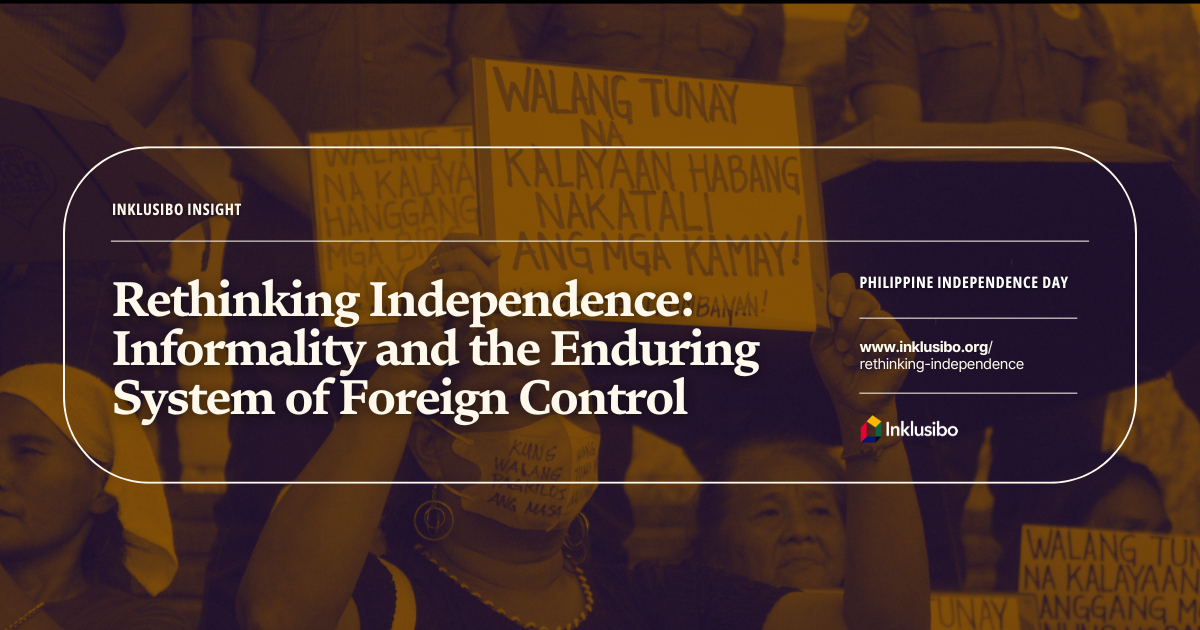More than a century after the United States first established its foothold in the Philippines, the political economic legacy of that relationship continues to shape the everyday lives of millions of Filipinos, most visibly in the rise and persistence of the country’s informal economy. While US foreign policy in the Philippines has often been framed in terms of strategic alliance and economic support, a closer look reveals a pattern of intervention that has consistently undermined inclusive development and entrenched structural inequality.
The roots of this relationship lie in the aftermath of the Spanish-American War, when the US bought the Philippines from Spain in 1898. The subsequent Philippine-American War was not only a brutal assertion of control but also the beginning of a long period of American influence over Philippine governance, infrastructure, and economic priorities. Though formal independence was achieved in 1946, the postcolonial reality was marked by continued US military presence and deep economic entanglement.
An Economy Engineered to be Fragile
In the decades that followed, US-backed neoliberal reforms, particularly those implemented during the 1980s under the guidance of international financial institutions (e.g. the International Monetary Fund and the World Bank), reshaped the Philippine economy in profound ways. Structural adjustment programs prioritized debt servicing, austerity, deregulation, privatization, and trade liberalization. While these policies were intended to stimulate growth and integration into global markets, they also weakened domestic industries, reduced public investment in social services, and exposed the country to market volatility.
This restructuring had ripple effects, none more visible than the surge in informal work. Informal work, according to the International Labour Organization (ILO), refers to employment relationships that lack legal or social protection, regardless of whether they occur within the informal or formal sector. As formal employment opportunities contracted under the weight of austerity and liberalization, millions of Filipinos were pushed into informal work—unregulated and largely unprotected by labor laws. Today, a little more than 40% of the labor force operates in the informal sector and through informal relations in the formal sector, performing essential but precarious roles as vendors, drivers, and gig workers.
This outcome is not incidental. The informal economy has been the default absorption mechanism for those excluded from the formal labor market. While it provides critical income for many, it also reflects systemic failures: insufficient job creation, a lack of social protections, and an over-reliance on low-cost labor. Informality in the Philippine context is less a sign of entrepreneurial dynamism and more a response to economic insecurity.
Military interventions have also played a role in shaping this dynamic. The long-standing presence of US bases, followed by agreements such as the Enhanced Defense Cooperation Agreement (EDCA), created localized economies around American military installations. These micro-economies often depend heavily on servicing US personnel, producing short-term gains but fostering long-term dependence. When these bases close or scale back, communities were left without sustainable economic alternatives, once again turning to informal labor for survival.
Moreover, the Philippine government’s strategy of labor export—a policy rooted in the structural weakness of the domestic economy—has further normalized the informalization of work. Overseas Filipino Workers (OFWs) now play a crucial role in supporting the national economy through remittances, but this comes at the cost of family separation, social dislocation, and continued underinvestment in local job creation.
While recent administrations have aimed to reduce poverty and stimulate growth through infrastructure and social assistance programs, the deeper structural issues remain unresolved. Efforts to formalize the economy have been limited by inconsistent data, fragmented policy implementation, and a lack of political will to challenge entrenched interests that benefit from the status quo.
What Real Sovereignty Would Look Like
If there is a path forward, it lies in reckoning with the long-term effects of foreign-led economic engineering and prioritizing a development model that centers on national industrialization, genuine agrarian reform, and an independent foreign policy. That means nationalizing critical industries like transportation, energy, water, and telecommunications; supporting and developing local manufacturing industries; dismantling feudal relations in large agricultural landholdings in the countryside; strengthening labor protections; investing in social protections and public services; and building an industrial policy that reduces dependencies on external markets.
The informal economy in the Philippines is not merely a domestic issue. It is a transnational story—one that traces its origins to historical imbalances of power and policy. On this Independence Day, we must recognize the present conditions shaped by this history, we must demand more than ceremonial freedom and fight for national sovereignty grounded in social justice, inclusivity, and dignity.

